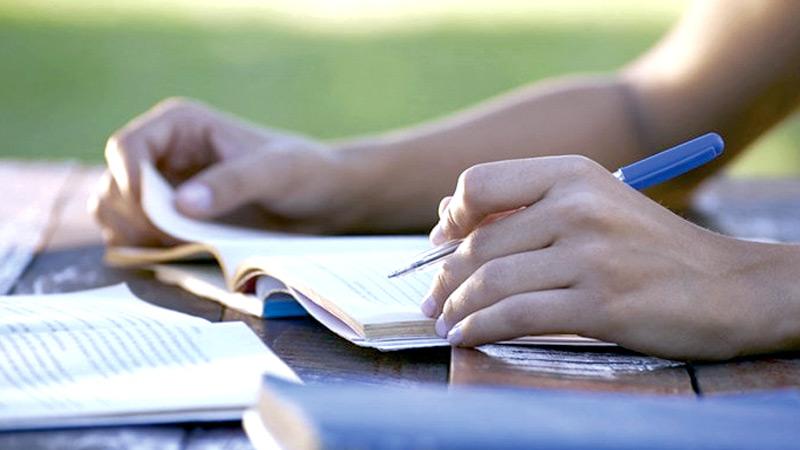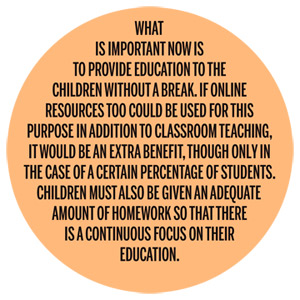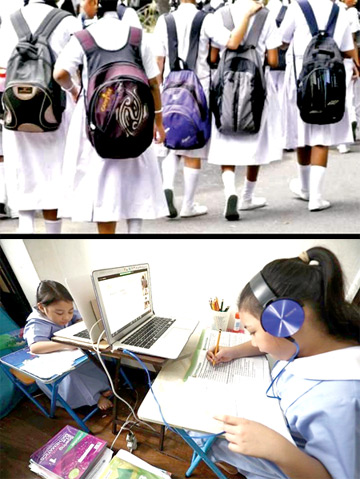
 The education of children countrywide was disrupted for nearly two years due to the Covid pandemic. Schools were held in fits and starts during this period and there was a massive shift to online education.
The education of children countrywide was disrupted for nearly two years due to the Covid pandemic. Schools were held in fits and starts during this period and there was a massive shift to online education.
The caveat was that only a certain percentage of students had the required equipment such as laptops and smartphones to receive lessons and connect with their teachers online. Even if they had, some students had to walk several kilometres to find a 4G signal. This effectively meant that some students were completely cut off from education of whatever variety.
It is only now, with the receding of the Covid pandemic, that we see schools coming back to normal (right now, they are closed for the April holidays). However, it goes without saying that the virus is unpredictable and there could yet be another wave, precipitated by another variant. This is why it is important to vaccinate all schoolchildren against Covid.
Catching up for lost time
 Assuming that the worst days of the pandemic are behind us, the students and teachers have to catch up for lost time and do their best. In fact, the Education Ministry has added an extra hour of in-person teaching to all classes from the next school term with this aim in mind. This is a step in the right direction, though how it will impact on tuition classes which are generally held on weekdays right after school is yet to be seen.
Assuming that the worst days of the pandemic are behind us, the students and teachers have to catch up for lost time and do their best. In fact, the Education Ministry has added an extra hour of in-person teaching to all classes from the next school term with this aim in mind. This is a step in the right direction, though how it will impact on tuition classes which are generally held on weekdays right after school is yet to be seen.
What is important now is to provide education to the children without a break. If online resources too could be used for this purpose in addition to classroom teaching, it would be an extra benefit, though only in the case of a certain percentage of students. Children must also be given an adequate amount of homework so that there is a continuous focus on their education.
 We also have to remember that tens of thousands of students are preparing for the GCE O/L and A/L examinations which will be held soon. In addition to the school closures, they have been hampered in this respect by the power cuts, which at one point stretched to 13 hours per day. Most students thus had to study by candlelight, which further strained their inclination to prepare for the exams. The power cuts should be drastically reduced, say to around three hours per day (in case fuel stocks do not arrive on time) so that these children can study without any interruption.
We also have to remember that tens of thousands of students are preparing for the GCE O/L and A/L examinations which will be held soon. In addition to the school closures, they have been hampered in this respect by the power cuts, which at one point stretched to 13 hours per day. Most students thus had to study by candlelight, which further strained their inclination to prepare for the exams. The power cuts should be drastically reduced, say to around three hours per day (in case fuel stocks do not arrive on time) so that these children can study without any interruption.
Let them study
With Avurudu around the corner, there are bound to be distractions on the home front too for students. While children no doubt love to engage in the festivities, parents must give them an opportunity to complete their daily quota of studies without any interruption. In this regard, the auspicious time for beginning work (Weda Alleema) can be used by students to begin studies, perhaps on a subject they do not like all that much or one that needs more revision. Similarly, the Ganu Denu (transactions) auspicious time would be a good chance for parents to provide new study books or materials to their school-age children.
It is equally important for parents to give the children some time to play during the Avurudu festive period, even though studies must come first. Play and physical exercise are essential for children who are growing up.
A healthy body and a sound mind resulting from play will be great assets for studies. Nevertheless, parents must keep an eye on the playtime of their children during Avurudu, lest they neglect their studies. This is especially so for children preparing for any examinations.
Careful planning, a must
Children who are due to sit for the examinations should not be taken on visits to relatives in far-flung places, as it will interfere with their studies and revisions. Besides, the danger of Covid-19 is still there and getting infected by the Coronavirus (or any other affliction) with the examination around the corner will not do any good for them. Such visits could be postponed until the examination is over or in the alternative, those relatives can be asked to come over.
Again, there should be no disturbance that can take the children’s attention away from their studies at this time. Parents must plan such visits rather carefully these days.
Children could also be distracted and even frustrated by certain events now happening in the country. The lack of certain essentials, the general state of the economy, protests and even political developments can impact negatively on the psyche of students, especially those who are sitting for the examinations.
The National Child Protection Authority (NCPA) has also weighed in on this issue. While it is virtually impossible to shield the children from these developments, the parents must create a conducive atmosphere at home where studies can be done in peace without dragging them along for political discussions etc.
It is also a good idea for all children to stick to a time-table, akin to the one they follow at school. This should include clearly defined time periods for various subjects, revision, past papers (for students sitting for examinations), meals and tea, personal hygiene, play and exercise/recreation and even watching TV, listening to the radio or going online for non-educational purposes. Meal times are a good opportunity for the parents to discuss any issues or difficulties pertaining to the studies of their children. Parents must always keep a tab on the progress of their children in terms of education without being intrusive per se.
Let’s face it, the children have been through a lot of stress due to the pandemic and various other factors beyond anyone’s control during the past two years. Stress is the last thing they need right now.
Therefore, parents must ensure a stress-free environment for their children at all times. Parents must not allow any domestic or other issues to disturb the study patterns of their children. It is generally well-known that a happy home is the key to children who excel in studies and school/national exams. The parents must make that happen and the rest will then will fall into place.
